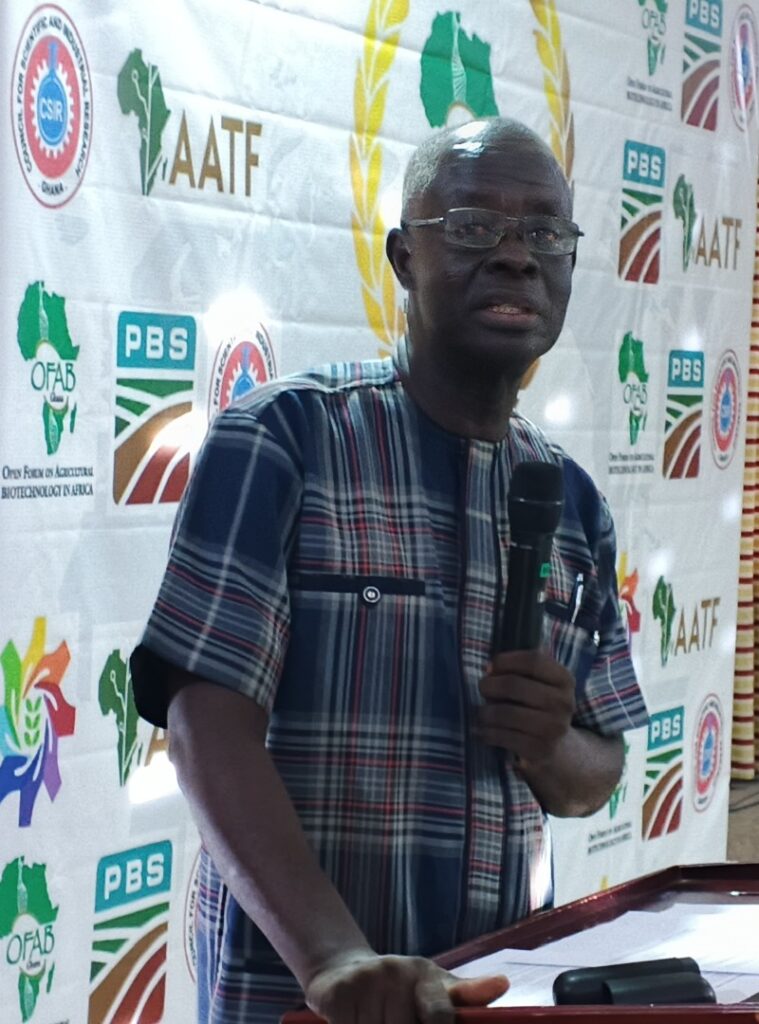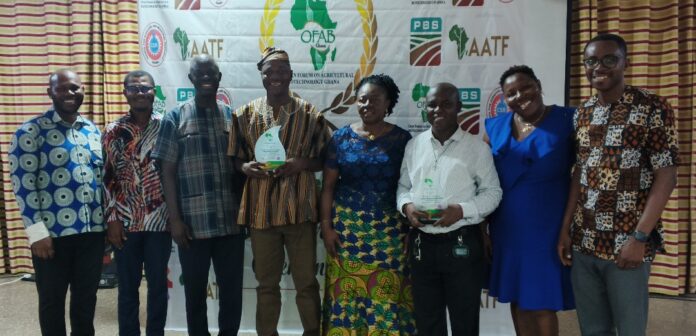The Ghana Chapter of the Open Forum on Agricultural Biotechnology (OFAB Ghana) have disclosed their resolve to continually reward scientific accuracy in reporting biotech-related stories with originality and clarity of interpretation in order to foster a better public understanding of agricultural biotechnology to make an impact.
The annual awards ceremony was organised by the Open Forum on Agricultural Biotechnology (OFAB) Ghana Chapter a non-governmental organization with support from the African Agricultural Technology Foundation (AATF) and CSIR Ghana awarded journalists for their outstanding contributions to credible science communication and for helping bridge the knowledge gap between scientists and the public.
This year’s OMAs had the theme “Credible Science Reporting, a Tool for Science-Led Economic Development in Ghana” held in Accra brought together scientists, policymakers, journalists, and development partners to highlight the critical role of the media in shaping public understanding of agricultural biotechnology.
OFAB Ghana Coordinator, Dr. Richard Ampadu-Ameyaw in a speech read on his behalf explained that despite the transformative potential of agricultural biotechnology and genetically modified organisms (GMOs) in addressing food security, climate change, and other agricultural challenges, the technology remains misunderstood in many parts of the world, including Ghana.
“Often, misinformation paints it as a “monster technology,” creating unnecessary fear and skepticism” he added.
According to him, it is crucial for policymakers to have access to accurate scientific information; this is where the media plays a pivotal role, acting as a bridge between scientists, policymakers, and the public to promote informed decision-making and adoption of the technology.
“PBR Cowpea in Ghana has received all necessary approvals and is in commercial production, which creates the right opportunity for journalists to use evidence-based reporting to bridge the knowledge gap and demystify agricultural biotechnology.
“Your efforts have helped demystify this science, promoting balanced and credible narratives in the public domain.
“We hope their achievements inspire others, especially younger journalists, to join this noble cause in the coming years; The guidelines are straightforward, and this could be your stepping stone to a distinguished career in science journalism” he said.
Former Director of the Biotechnology and Nuclear Agriculture Research Institute (BNARI) of the Ghana Atomic Energy Commission, Professor Kenneth Ellis Danso, said the awards are helping to inspire a new wave of science-focused journalism in the country.
He noted that credible reporting is essential as the nation moves toward the commercial adoption of genetically modified (GM) crops, such as the BT cowpea, developed by the Savannah Agricultural Research Institute (SARI).

“The quality of media stories has greatly improved. Journalists are explaining biotechnology clearly and helping the public see the benefits rather than the fears. That’s how we build trust, the BT cowpea is already helping farmers, especially in Northern Ghana, to increase productivity and reduce losses caused by pests” he said.
Public Affairs Officer of the Ghana Journalists Association (GJA), Zadok Kwame Gyesi, said science journalism plays a key role in building public trust and shaping national conversations on food security and innovation.
“Science journalism helps people understand complex ideas in a simple way. That’s why scientists must see journalists as partners, not outsiders,” he said.
He explained that misinformation has slowed the acceptance of biotechnology in the country, stressing that only factual and balanced reporting can correct public fears. “A single misleading headline can create panic and destroy years of scientific progress,” he warned.
He urged scientists to make data and information more accessible and to engage with journalists regularly.
He also called on journalists to verify their information carefully and to seek expert opinions when reporting on sensitive topics like GM crops, food safety, and agricultural innovation.
The awardees, Mr. Noah Nash Hoenyefia of GHOne TV and Mr. Solomon Gumah of Ghana News Agency (GNA), each received a plaque of honour, a cash prize of GH₵ 3,000 and attractive hampers for their achievements.
The awardees described the OMAs as huge encouragement for agricultural reporters. They thanked OFAB for creating a platform to recognise the hard work of science reporters and pledged to continue producing stories that inform and educate.
Source: Nana Yaw Reuben



